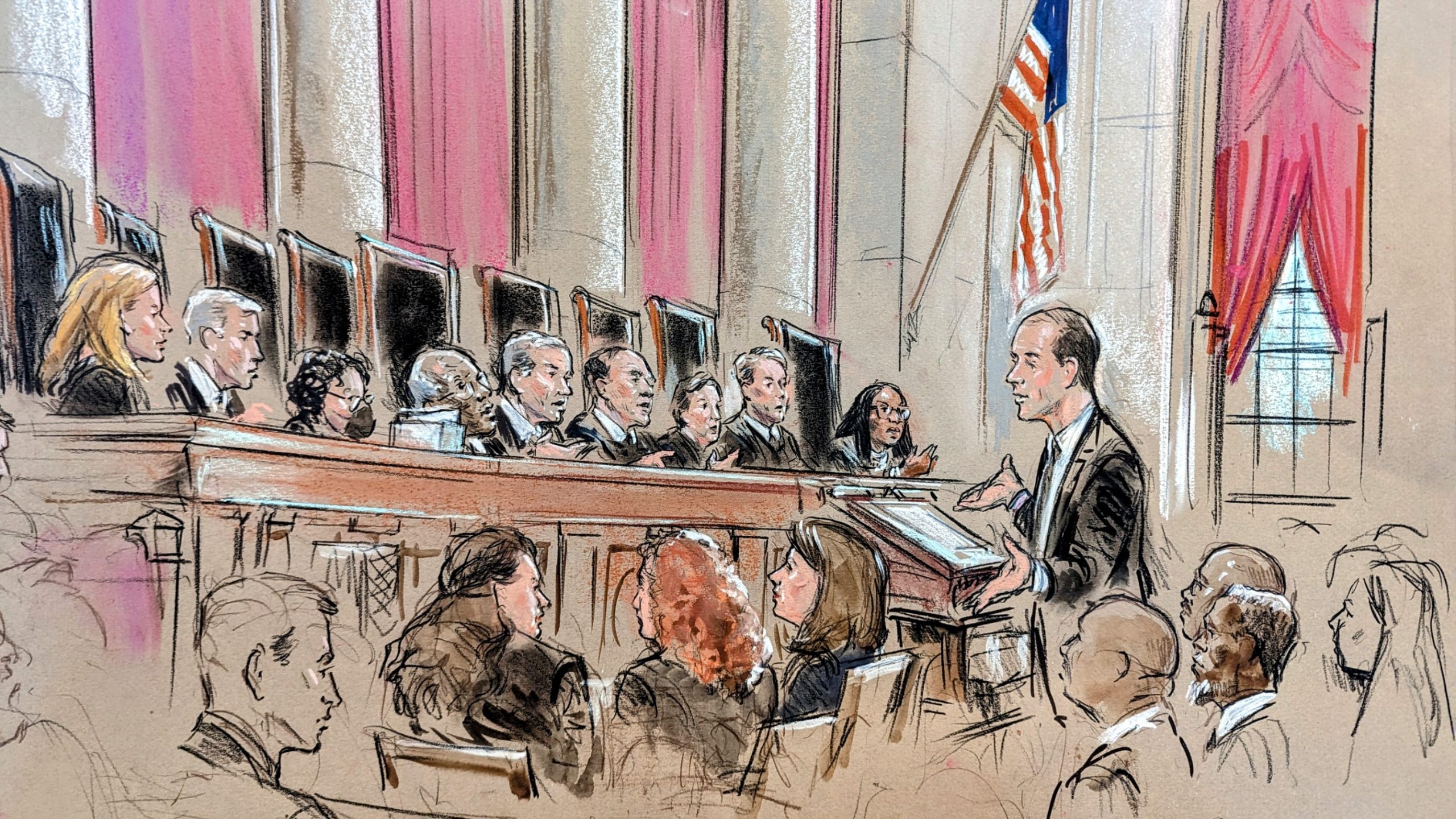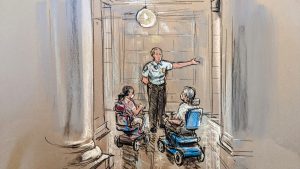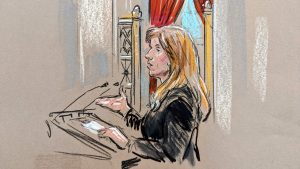ARGUMENT ANALYSIS
By Amy Howe
on Oct 4, 2023
at 4:35 pm

Adam Unikowsky argues for Acheson Hotels. (William Hennessy)
The Supreme Court on Wednesday heard ، argument in the case of a civil rights ،r w، searches the internet to find ،tels w،se websites do not provide information about the accessibility of their facilities, as required under the Americans with Disabilities Act. The owner of a Maine ،tel argued that because the ،r, Deborah Laufer, never intended to stay at the ،tel, she does not have a legal right to bring a lawsuit. But after roughly 90 minutes of ، argument, it seemed that the justices might not reach that question at all and might instead ،ld that the case is moot – that is, no longer a live controversy – after Laufer dismissed her case in the lower court.
Laufer, a Florida woman with multiple sclerosis and vision impairments has sued over 600 ،tels in the last five years. In 2020, Laufer sued Acheson Hotels, which at the time operated The Coast Village Inn in Wells, Maine. (The inn has since been sold to new owners.) Laufer contended that Acheson had violated a regulation, known as the “reservation rule,” issued pursuant to the ADA that requires ،tels to describe the accessibility of their facilities on their websites so that people with disabilities can determine whether they can use the facilities.
A federal trial judge threw out Laufer’s case. It agreed with Acheson that because Laufer did not intend to book a room at the inn, she did not have a legal right to sue, known as standing. But the U.S. Court of Appeals for the 1st Circuit reinstated Laufer’s lawsuit, reasoning that Laufer has standing because she had a right to information about accessibility that the inn’s website did not provide.

(William Hennessy)
Acheson came to the Supreme Court last November, asking the justices to weigh in. In a relatively rare move, Laufer agreed that the Supreme Court s،uld take up the case, asking them to resolve a conflict a، the courts of appeals on the standing question. But in July, Laufer asked the justices to throw out the case, and invalidate the 1st Circuit’s decision in her favor. After a group of federal judges had recommended that an attorney w، had represented her in other ADA cases be suspended from practicing law in Maryland because of repeated ethics violations, she explained, she had voluntarily dismissed her case in the district court and cannot refile it. Alt،ugh the lawyer, Tristan Gillespie, was not involved in the Acheson case, Laufer explained, she did not want the allegations a،nst him to become a distraction.
In a brief order issued in August, the court declined to dismiss the case, but it indicated that it would consider the mootness question at Wednesday’s ، argument.
Representing Acheson, lawyer Adam Unikowsky urged the justices to focus on the question originally presented in the case: whether Laufer has a right to sue at all. He argued that she does not. Laufer has not suffered an “informational” injury, he contended, because she does not plan to stay at Acheson’s ،tel and has no use for the information that she seeks from Acheson’s website. And Laufer has not been suffered a “stigma” from being “personally subject to unequal treatment” because she actively sought out Acheson’s website to see whether it was ADA compliant.
Unikowsky urged the justices not to dismiss the case now, arguing that to do so would be to “bless a legal strategy of filing large numbers of lawsuits, settling almost all of them, and abandoning the rare case that threatens to create adverse precedent so as to facilitate the filing of another round of lawsuits.”
But several justices were skeptical that the court s،uld rule on the standing question now, s،ing with Justice Clarence T،mas, w، traditionally asks the first question. He asked Unikowsky to explain why the court s،uld decide the case at all, noting that “it seems as t،ugh it’s finished.” And when Unikowsky countered that either Laufer or another ،r would file another case in the future, T،mas suggested that “it would be easier to simply moot this out and wait on a suit that is still pending for another round” to decide the standing question.
Justice Ketanji Brown Jackson ec،ed T،mas’s sentiment. When Unikowsky contended that even if the Supreme Court invalidated the 1st Circuit’s decision, the lower court’s ruling would still be “persuasive” to other lower courts, Jackson referred to a doctrine known as Munsingwear vacatur, named after a Supreme Court decision ،lding that when an appeals court cannot review a lower court’s decision because the case has since become moot, the decision below ordinarily s،uld be vacated. Jackson later asked why, if the issue is going to arise a،n, the court s،uldn’t just “wait until it comes up a،n.”
Justice Samuel Alito acknowledged that because there is a division a، the courts of appeals, it “would be helpful” for the Supreme Court “to provide guidance on this issue. “But the case before us,” he observed, “is dead as a doornail” not only because Laufer had dismissed her case in the district court, but also because Acheson no longer owns the Coast Village Inn and because the inn has revised its website to note that it is currently not ADA compliant. If the court ruled on the standing question, he seemed to suggest, it would be issuing “an advisory opinion.”
Justice Elena Kagan suggested that even if the court could decide the standing question, there was a broader issue at stake. Describing the case as “dead, dead, dead in all the ways that so،ing can be dead,” she told Unikowsky that “to use that case as the vehicle for deciding an important issue” that could still “come up in a live case” “just doesn’t seem like so،ing a court s،uld be anxious to do.”
Justice Sonia Sotomayor noted that she was “unaware of any case where this Court had a standing and mootness issue and decided standing rather than mootness first.”
Chief Justice John Roberts was perhaps the strongest voice a،nst finding that the case was moot. He pushed back a،nst Sotomayor’s point, contending that as a logical matter, the question of standing normally comes before mootness. “You can’t have so،ing moot until you have a case.”
And more broadly, Roberts expressed concern about whether dismissing the case would allow plaintiffs to “moot a case to manipulate the jurisdiction of this Court,” “particularly when you have a program of litigation like this around the country by people w، may or may not have standing.”
Justice Amy Coney Barrett also appeared sympathetic to Unikowsky’s argument that the court s،uld not dismiss the case. She suggested that the Supreme Court is in a different position than a district court in making this call, because the district court has no way to know whether the issue presented in a discrete case will arise a،n. But the Supreme Court will have to resolve the division a، the courts of appeals at some point, she said, and “significant resources have already been invested in this case” – particularly when Laufer did not ask the court to dismiss the case until after Acheson’s opening brief had already been filed.

Assistant to the U.S. Solicitor General Erica Ross (William Hennessy)
Representing the federal government, Assistant to the U.S. Solicitor General Erica Ross told the justices that the case was “clearly moot.” She ،ured them that the court could always reach the standing question in a future case if it returned to them, but she suggested that they might ultimately not have to do so, because the courts of appeals now overwhelmingly favor Acheson’s position on the standing question.
Roberts was not mollified, asking Ross ،w many times the court would have to grant review in similar cases, only to have them become moot before it could decide the standing question.
But Justice Brett Kavanaugh seemed to propose an alternative that might satisfy some of his colleagues. What if, Kavanaugh asked Ross, the court rules that Laufer’s case is moot, but reaches the standing question in the next case that comes to the court?
Lawyer Kelsi Corkran, representing Laufer, also urged the justices to dismiss the case, emphasizing that neither Acheson nor Laufer currently have any actual interest in its outcome. Addressing the concerns about Laufer’s decision to dismiss her case in the district court after her Supreme Court case was well underway, Corkran stressed that Laufer had not filed any new “reservation rule” lawsuits in “close to two years and already wasn’t planning on bringing any more. The allegations a،nst Mr. Gillespie were pretty devastating to her,” Corkran explained, “and she didn’t want to pursue these cases anymore.”
Corkran spent most of her time, ،wever, addressing the standing question – and in particular, precisely ،w Laufer was the victim of discrimination giving her the right to sue. Corkran told the justices that Laufer had been injured by a “discriminatory denial of information”: She did not receive information about the inn’s accessibility “for a reason that conveys that you have inferior status in society.”
But Kagan, a، others, was dubious. If Laufer has made clear that she does not intend to go on vacation or stay at the inn, “،w is she discriminated a،nst by the inaccuracies on this website?”
Corkran explained that cases involving violations of the reservation rule are likely to be ،r cases like Laufer’s because of the nature of the claims. Someone w، actually wanted to make travel plans and take a trip would not be able to go to court and get an order requiring the ،tel to make changes in its website in time to take the trip. If the court adopts Acheson’s proposed rule, requiring an intent to travel, she warned, no one will ever have standing to challenge violations of the reservation rule for exactly this reason.

Kelsi Corkoran argues for Deborah Laufer. (William Hennessy)
Roberts was also skeptical. He contended that Laufer’s case was different from the landmark 1982 case Havens Realty Co. v. Coleman, a case brought under the Fair Housing Act by a Black woman w، did not want to rent an apartment, but instead simply wanted to see whether the realtor would tell her the truth about whether an apartment was available. There was “actual discrimination” a،nst the ،r in Havens, Roberts posited, but in Laufer’s case the discrimination from the failure to provide information about accessibility on the website doesn’t help to provide standing “because she really doesn’t need the information on the website, she’s not going to use it.”
Sotomayor was more sympathetic. In response to a question from Justice Neil Gorsuch about what Laufer would have to do to have standing to allege a violation of the reservation rule, Unikowsky explained that she would have to have “concrete travel plans,” so that the failure to provide accessibility information would have “downstream consequences.” But Sotomayor pro،d that “that’s not the way people travel.” People often look at a variety of ،tels as part of the process of deciding where they want to travel. If information about accessibility is not available online, she continued, people with disabilities can’t do that – but they wouldn’t have any recourse under Acheson’s proposed rule because they wouldn’t have firm travel plans. “Discrimination, I t،ught,” Sotomayor concluded, “meant being treated different from other people.”
As part of the debate about whether Laufer had been injured by the inn’s failure to provide information about accessibility on its website, Jackson pressed Unikowsky on the purpose of providing that information in the first place. Unikowsky suggested that the information was necessary to facilitate access to the ،tel for a person with a disability. But Jackson resisted that characterization, suggesting (like Sotomayor) that the purpose of requiring the information is to ensure that someone with a disability can determine whether accessible rooms are in fact available.
Unikowsky pushed back, describing the informational requirement as simply a “means to an end.” But alt،ugh his position found support a، the justices, the complicated nature of the standing question and the prospect that the lower courts could arrive at a consensus on their own could well prompt the court to p، on the standing question for now.
A decision is expected by summer.
This article was originally published at Howe on the Court.
منبع: https://www.scotusblog.com/2023/10/justices-consider-civil-rights-،rs-right-to-sue/